 W
WGoogle Cardboard is a virtual reality (VR) platform developed by Google. Named for its fold-out cardboard viewer into which a smartphone is inserted, the platform is intended as a low-cost system to encourage interest and development in VR applications. Users can either build their own viewer from simple, low-cost components using specifications published by Google, or purchase a pre-manufactured one. To use the platform, users run Cardboard-compatible mobile apps on their phone, place it into the back of the viewer, and view content through the lenses.
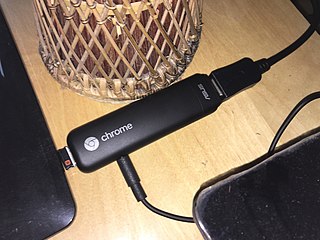 W
WThe Chromebit is a stick PC running Google's Chrome OS operating system. When placed in the HDMI port of a television or a monitor, this device turns that display into a personal computer. Chromebit allows adding a keyboard or mouse over Bluetooth or Wi-Fi. The device was announced in April 2015 and began shipping that November.
 W
WA Chromebook is a laptop or tablet running the Linux-based Chrome OS as its operating system. Chromebooks are primarily used to perform a variety of tasks using the Google Chrome browser, with most applications and data residing in the cloud rather than on the machine itself. All Chromebooks released since late 2017 can also run Android apps. Some Chromebooks can also run Linux apps.
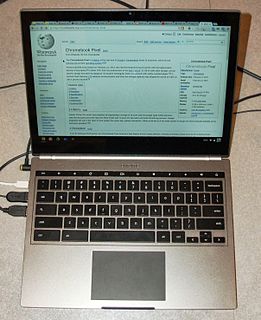 W
WThe Chromebook Pixel is a 2013 laptop at the high end of Google's Chromebook family of machines, which all come preinstalled with Chrome OS operating system. The Chromebook Pixel is part of the Google Pixel series of consumer electronics. Chromebook Pixel stopped receiving software and security updates in August 2018.
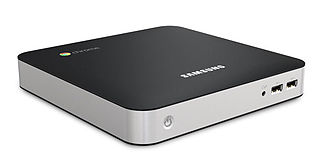 W
WA Chromebox is a small form-factor PC running Google's Chrome OS operating system. The device debuted in May 2012.
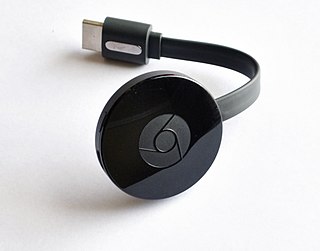 W
WChromecast is a line of digital media players developed by Google. The devices, designed as small dongles, can play Internet-streamed audio-visual content on a high-definition television or home audio system. The user controls playback with a mobile device or personal computer through mobile and web apps that support the Google Cast technology, or by issuing commands via Google Assistant. Alternatively, content can be mirrored from the Google Chrome web browser on a personal computer or from the screen of some Android devices.
 W
WDaydream is a discontinued virtual reality (VR) platform which was developed by Google, primarily for use with a headset into which a smartphone is inserted. It is available for select phones running the Android mobile operating system that meet the platform's software and hardware requirements. Daydream was announced at the Google I/O developer conference in May 2016, and the first headset, the Daydream View, was released on November 10, 2016. To use the platform, users place their phone into the back of a headset, run Daydream-compatible mobile apps, and view content through the viewer's lenses. A standalone headset with integrated hardware, the Lenovo Mirage Solo, does not require a phone to use.
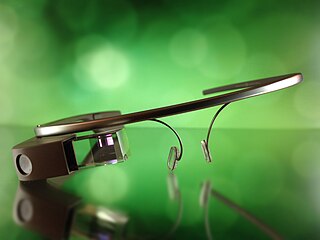 W
WGoogle Glass, or simply Glass, is a brand of smart glasses—an optical head-mounted display designed in the shape of a pair of eyeglasses. It was developed by X with the mission of producing a ubiquitous computer. Google Glass displays information in a smartphone-like, hands-free format. Wearers communicate with the Internet via natural language voice commands.
 W
WGoogle Nest is a brand of Google LLC used to market smart home products including smart speakers, smart displays, streaming devices, thermostats, smoke detectors, routers and security systems including smart doorbells, cameras and smart locks.
 W
WGoogle Nest, previously named Google Home, is a line of smart speakers developed by Google under the Google Nest brand. The devices enable users to speak voice commands to interact with services through Google Assistant, the company's virtual assistant. Both in-house and third-party services are integrated, allowing users to listen to music, control playback of videos or photos, or receive news updates entirely by voice. Google Nest devices also have integrated support for home automation, letting users control smart home appliances with their voice command. The first device, Google Home, was released in the United States in November 2016; subsequent product releases occurred globally from 2017–2019.
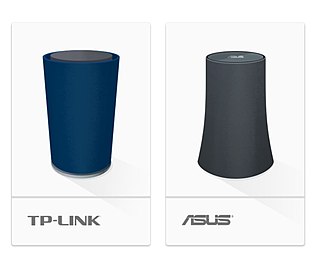 W
WGoogle OnHub is a residential wireless router product from Google, Inc. The two variants are manufactured by TP-Link and ASUS. Google's official tagline for the product is "We’re streaming and sharing in new ways our old routers were never built to handle. Meet OnHub, a router from Google that is built for all the ways you use Wi-Fi." In 2016, Google released the Google Wifi router with mesh networking, and combined its functionality and network administration with the OnHub so that OnHub and Google Wifi may both be used interchangeably in mesh networks.
 W
WGoogle Pixel and Pixel XL are Android smartphones designed, developed and marketed by Google. They were announced during a press event on October 4, 2016, and serve as the first smartphones in the Google Pixel hardware line, succeeding the Nexus line of smartphones. The smartphones were succeeded by the Pixel 2 in 2017, the Pixel 3 in 2018, the Pixel 4 in 2019, and by the Pixel 5 in 2020.
 W
WPixel 2 and Pixel 2 XL are Android smartphones designed and developed by HTC and LG respectively, and marketed by Google. They were announced during a Google event on October 4, 2017, as the successors to the Pixel and Pixel XL. They were released on October 19, 2017, and serve as the second set of smartphones in the Google Pixel hardware line. On October 9, 2018, they were succeeded by the third-generation Pixel 3 and Pixel 3 XL.
 W
WPixel 3 and Pixel 3 XL are Android smartphones from the Google Pixel product line. The phones were officially announced on October 9, 2018 and then released initially in the United States on October 18, 2018 and other parts of the world on November 1, 2018. They are the successors to the Pixel 2 and Pixel 2 XL.
 W
WPixel 3a and Pixel 3a XL are Android smartphones from the Google Pixel product line. Serving as midrange variants of the Pixel 3 and Pixel 3 XL, the phones were officially announced on May 7, 2019 at Google I/O, seven months after the announcement of the original Pixel 3 lineup. Google discontinued the Pixel 3a on July 1, 2020, and announced its successor, the Pixel 4a, on August 3, 2020.
 W
WPixel 4 and Pixel 4 XL are Android smartphones from the Google Pixel product line, serving as successors to the Pixel 3. The phones were officially announced on October 15, 2019 and released in the United States on October 24, 2019. They were discontinued in August 2020.
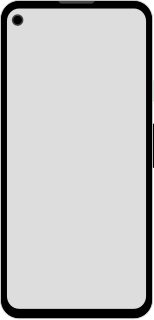 W
WPixel 4a and Pixel 4a (5G) are Android smartphones from the Google Pixel product line. Serving as mid-range variants of the Pixel 4 and Pixel 4 XL, the Pixel 4a was officially announced on August 3, 2020, while the Pixel 4a (5G) was officially announced on September 30, 2020.
 W
WPixel Buds are a line of wireless earbuds developed and marketed by Google. The first generation of the Pixel Buds were launched on October 4, 2017 at Google's Made By Google launch event and were available for preorder on the Google Store the same day. They have the Google Assistant built-in and support Google Translate.
 W
WPixel C is a 10.2-inch (260 mm) Android tablet developed and marketed by Google. The device was unveiled during a media event on September 29, 2015. On October 9, 2018, it was succeeded by the Pixel Slate.
 W
WProject Ara was a modular smartphone project under development by Google. The project was originally headed by the Advanced Technology and Projects team within Motorola Mobility while it was a Google subsidiary. Google retained the ATAP group when selling Motorola to Lenovo, and it was placed under the stewardship of the Android development staff; Ara was later split off as an independent operation. Google stated that Project Ara was being designed to be utilized by "6 billion people": 1 billion current smartphone users, and 5 billion feature phone users.
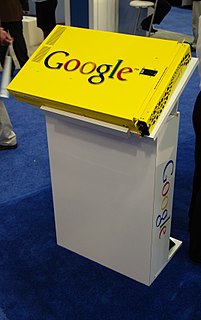 W
WThe Google Search Appliance was a rack-mounted device that provided document indexing functionality. The operating system is based on CentOS. The software is produced by Google and the hardware is manufactured by Dell and the final 2009 version was based on Dell's PowerEdge R710. Google announced the phase out of the appliance in early 2016 and a complete discontinuation by 2019.
 W
WTensor Processing Unit (TPU) is an AI accelerator application-specific integrated circuit (ASIC) developed by Google specifically for neural network machine learning, particularly using Google's own TensorFlow software. Google began using TPUs internally in 2015, and in 2018 made them available for third party use, both as part of its cloud infrastructure and by offering a smaller version of the chip for sale.
 W
WGoogle Nest Wifi, the successor to Google Wifi, is a line of mesh-capable wireless routers and add-on points developed by Google as part of the Google Nest family of products. The first generation was announced on October 4, 2016, and released in the United States on December 5, 2016. The second generation was announced at the Pixel 4 hardware event on October 15, 2019, and was released in the United States on November 4, 2019.